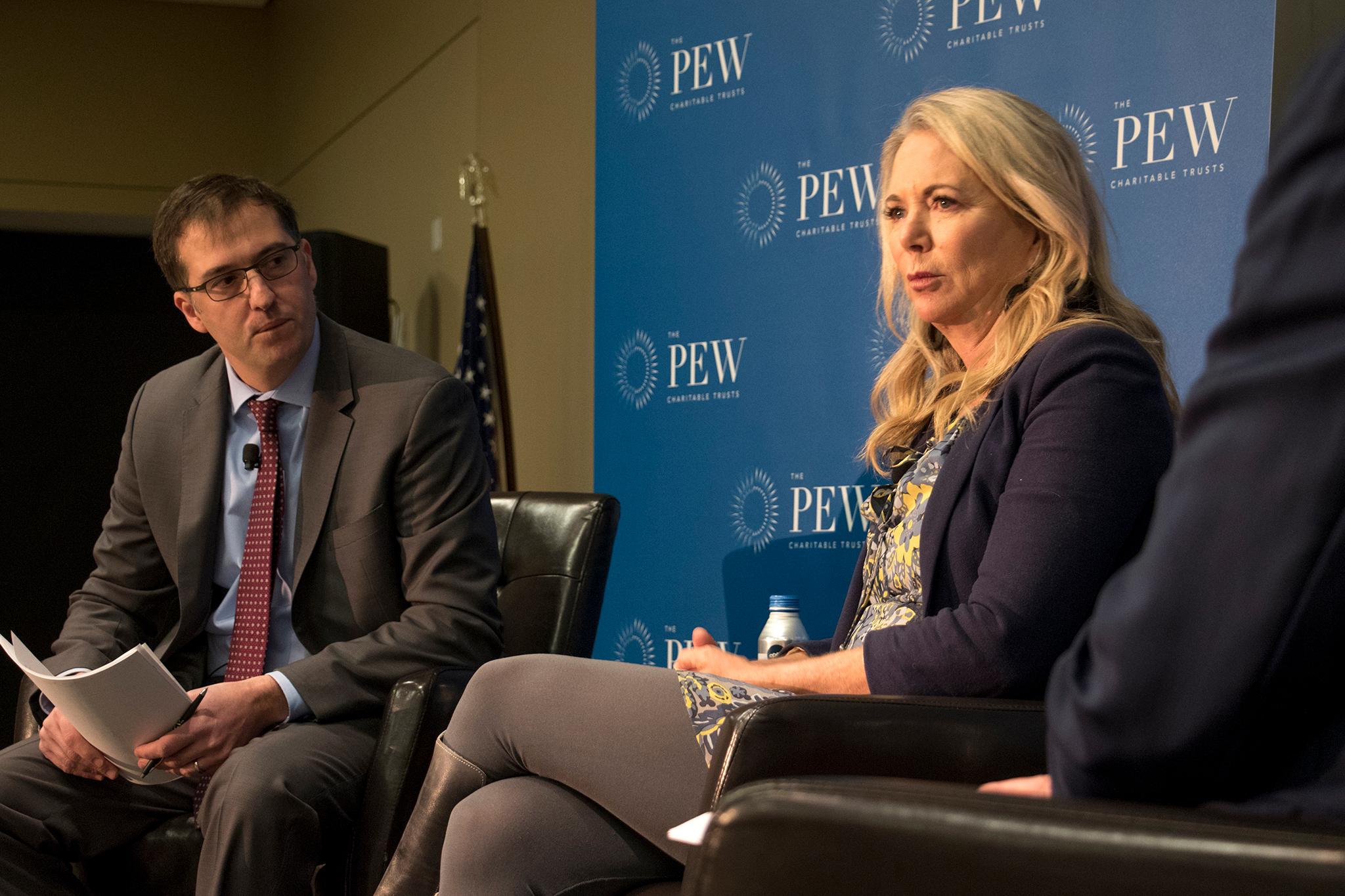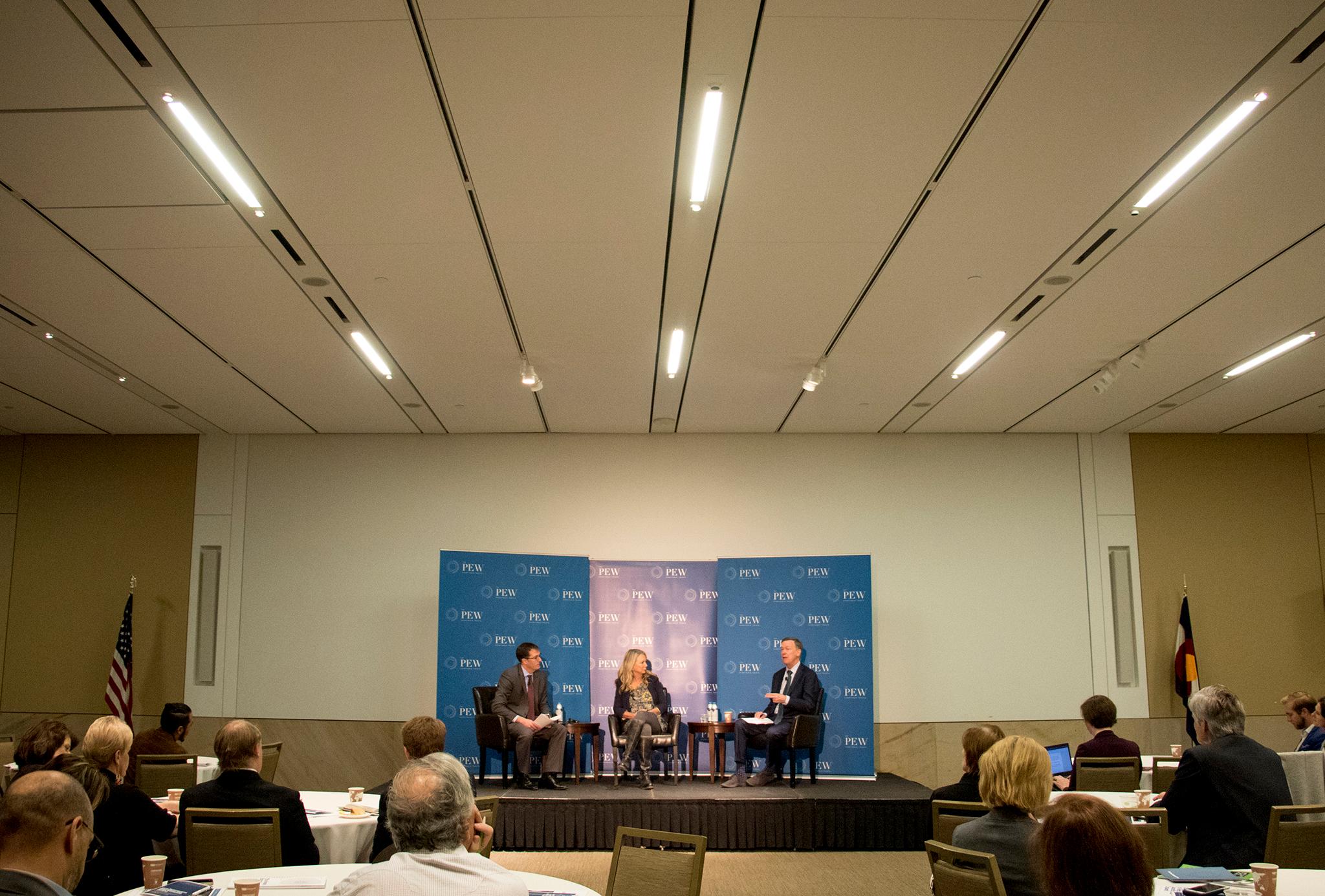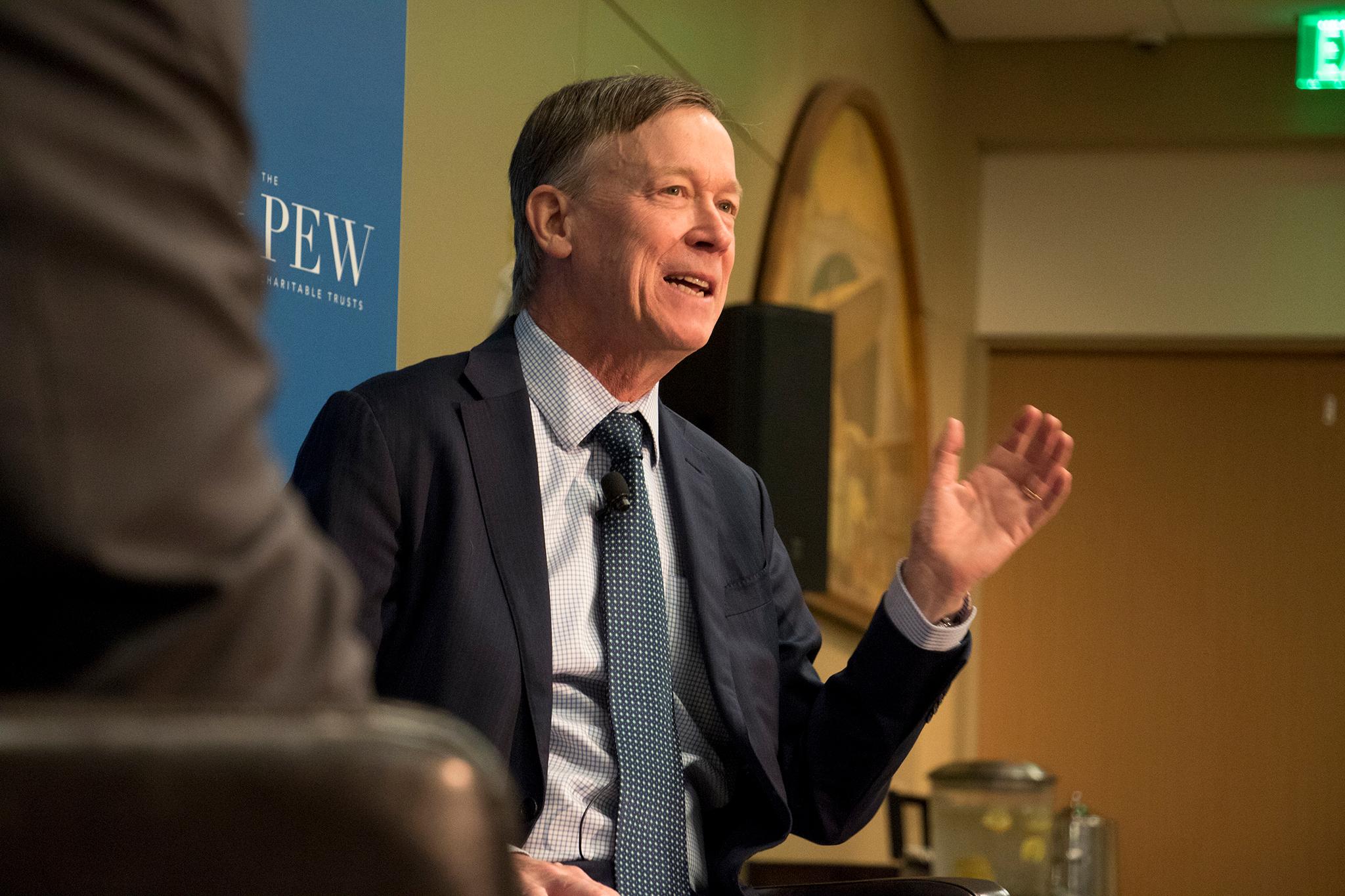Pew Charitable Trust recently held up Colorado as a glowing example of how managing regulations could end up benefiting both businesses and the governments responsible for creating them.
On Tuesday, the nonpartisan organization brought together the principal architect of improving those regulations, Gov. John Hickenlooper, and New Belgium Brewing Company co-founder and executive chair Kim Jordan for a conversation.
After discussing regulations, business and economic development, as well as other wonky topics with Jordan and moderator Michael D. Thompson of Pew, Hickenlooper said he sees some ways for his approach to work on a larger scale.
He ran his first campaign for governor on turning Colorado into the most pro-business state in the union while ensuring the highest ethical and environmental standards. It's led Colorado to become a state where people can start a business from their phone and to become the first state to pass methane emission restrictions.
"This notion of trying to -- and I guess the word is harmonize -- the federal government with the state government with the local governments is at the root of good government, of making government effective, efficient and elegant," Hickenlooper said.
Hickenlooper said that "EEE" mantra was part of one of his gubernatorial campaigns. It formed part of his message to lessen the burden for businesses to meet regulations and streamline how agencies would be available to businesses.
Hickenlooper, who didn't mention White House aspirations during Tuesday's discussion, is in a somewhat unique position if he ends up running for federal office. He's served in local office as mayor of Denver and is finishing up his second term as governor of Colorado.

His third step forward would be figuring out how to bring some of what he's done on the local and state level to the federal level, which doesn't have a great reputation for getting things done efficiently.
"There's often good reasons why there's this discord but in other ways, asking the federal government to go work with the local states to make sure our districts all overlap each other, I don't think that's an impossible task," Hickenlooper said.
"The federal government has historically always thought, 'We're better than everybody else, we're going to do it the way we think is best and to heck with what the people in some local municipalities or some local county think,'" Hickenlooper added.
Jordan said she isn't "anti-regulation" but there are policies that leave her scratching her head. As a brewer, she's not sure why, for example, beer breweries in Colorado aren't allowed to make hard cider.
"I don't know why," Jordan said. "I can see saying, no you can't make spirits, but spirits is a whole different process, with a whole different set of equipment. But cider is something that can be made in the same vessels, but for reasons that aren't really clear, can't be done."
It's an instance where Jordan said people from within the industry can come to the table and hash out a possible solution.
The discussion was connected to an August report published by Pew Charitable Trust, which cited Colorado and Hickenlooper for setting an example.
The report was titled "State Strategies to Help Businesses Launch and Expand." Co-author Melissa Maynard said the report makes the case that improving how states regulate business is "a powerful, cost-effective and a sustainable approach" to economic development.
"A number of states have experimented with this approach," Maynard said. "But Colorado has gone pretty far in trying to deploy it across state agencies."

Sam Bailey, vice president of economic development at Metro Denver Economic Development Corporation, mentioned Hickenlooper's Pits and Peeves initiative during his first term as an example of steps he took to try and improve regulations.
The initiative convened local businesses, advocates, nonprofits and other associations in cities around the state to come together and provide feedback about issues with regulatory red tape. It also helped create a list of rules that would be reviewed and potentially repealed.
Bailey worked under Hickenlooper's administration in its economic development office from 2011 to 2016. The initiative he mentioned was also brought up by Hickenlooper during Tuesday's discussion.
"I think that fostered a real focus on how we improve government culture so that there is more of a focus on customer services," Bailey said.
Rich Jones, the director of policy and research at the Denver-based progressive public policy group Bell Policy Center, said Hickenlooper kept his word when he said he would be a pro-business governor.
"He was a former business guy and entrepreneur, so he comes from that background and sense of things, that I think he really did apply a lot of that sort of mindset as his time as governor," Jones said. "He's been effective at that."
Hickenlooper isn't the first governor to try to tackle regulations.
Before Hickenlooper, Jones said other governors all tried looking at regulations. But Hickenlooper's administration took added measures to find and review regulations that may have hindered economic development. He mentioned Pits and Peeves as an example of his attention to detail.
"From that standpoint, I think he was probably, he had a broader approach and was very thorough about it," Jones said. He thinks this will end up being a bigger part of Hickenlooper's legacy as governor than any other before him. "He committed a fair amount of time, effort and resources for it."
Bailey said Hickenlooper believes the state should function as a partner, not a burden when it comes to economic development.
One way Hickenlooper managed to balance interests was getting both the oil and gas industry and environmentalists to agree on methane emission rules. He chatted with both environmental advocates and oil and gas executives, coming to a compromise that led to Colorado becoming the first state to limit its methane emissions from oil and gas operations in 2014.

The key to the comprise? Hickenlooper said it involved ensuring both sides were credited with the change.
"It was a little bit like the Hatfields and McCoys. I mean there was no trust, everyone hated each other," Hickenlooper said during the discussion. "The government role was really to be the convener, and bring people together and create a safe space where everyone felt that they were getting a fair shake."
So does Hickenlooper prefers lower regulatory burdens over, say, tax incentives to draw businesses?
The governor was asked which one of the two, from the state's perspective, can have more value.
"Our experience is that trying to provide predictability of regulatory efforts and then trying to make them as efficient and as effective as possible, and including the businesses and the nonprofits... to me that trumps or outranks just the simple incentives," Hickenlooper said.
Denver was among several cities making a high-profile but ultimately failed attempt to lure Amazon's new headquarters. The winning cities, New York City and Crystal City, Virginia, faced some backlash over the millions in incentives the cities offered.
Those incentives could have been in the neighborhood of $10 million Denver.
Hickenlooper said, generally speaking, incentives have time limits. Regulatory frameworks are a bit more permanent.
"I base that partly on our incentives that we offer are nowhere near as much as what a state like Texas or New York or Illinois might offer," Hickenlooper said. "Yet, we still seem to get our share of companies."














